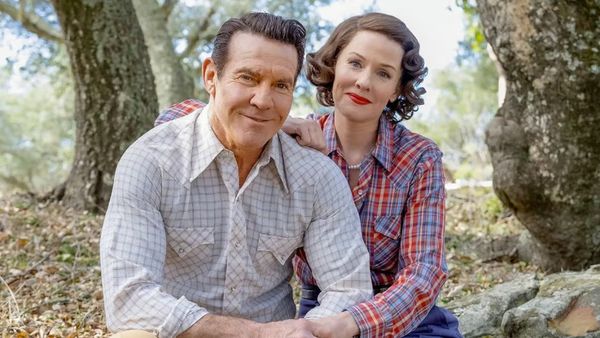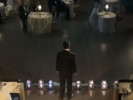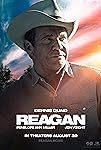Eye For Film >> Movies >> Reagan (2024) Film Review
Reagan
Reviewed by: Andrew Robertson

There are at least 40 biographies of America's 40th president, who took office in his 70th year. There's at least 70 books about Reagan, an autobiography and various collections of wit and wisdom. 'The Great Communicator', as he was known, left an impact much greater than his movie career. It's an overlap that itself made a mark on film, there's a joke in Back To The Future about his election which seems absurd in 1955. That is until Doc Brown discovers Marty's video camera, and suddenly the television as a door to the oval office makes sense.
Reagan remains a controversial politician, a fate not uncommon for anyone still in living memory. How much the world has changed since his childhood in Illinois and how much it was changed by his time in Washington DC are markers that further complicate judgement. What makes it simpler is the course that Reagan attempts to steer.

Based on Paul Kengor's 2007 biography The Crusader, it's a film that's been in development for some time. It's a coincidence that Dennis Quaid turns 70 this year himself, not least because much of the filming took place in 2020 during Covid restrictions. Kengor's book is subtitled Ronald Reagan and the Fall of Communism and the film uses that as its lens. The story is told by Jon Voight's composite character Viktor Petrovich. An apparatchik within the KGB, a somewhat improbable framing device has him explaining Reagan's story to an up and coming politician. It's not the only delicate threading of current politics in the film, but it's one of the more noteable.
Three actors play Ronnie, Quaid talked in interview about wanting to avoid impersonation but he's got the rhythms, a sense of it. One absolutely rooted in a working relationship with Penelope Ann Miller as Reagan's wife. While the backgrounds and costumes might change, the chemistry between the two of them is rock solid. From Las Vegas revues to lush valleyed ranches, from hospital theatres to Hollywood stages Ron and Nancy are a team. Snippets of protests about the handling of the AIDs crisis and a particular headline chosen to reflect the National Childhood Vaccine Injury Act do raise questions of how much they did together, and are among the current political questions that Reagan otherwise tries to avoid.
We get moments, sometimes in flashback, of the younger Reagan. 'Dutch', a bookish child is played by Tommy Ragen, the more athletic collegiate lifeguard who'll become a screen star is played by TV veteran David Henrie. Everywhere else it's Quaid, sometimes aided by special effects, by set dressing, by the fact that it's the olden days so everyone smokes, and more often than not by his own charisma.
Reagan was, famously, a joker, and many of the best lines in the film are ones that scholars of the jellybean gourmand will know. That doesn't mean they don't land, and even knowing the broad outlines and some of the details there were areas explored that were completely new to me. That included a Las Vegas revue show when his acting career was in his doldrums. He did actually appear on stage hawking Pabst Blue Ribbon at the Hotel Last Frontier. There's a photo among the credits and it's one of several places where they've carefully matched historic record to historic action.
On occasion that's been done with obvious camera techniques, though in general it's technically polished. They did film at the Reagans' ranch, and as a habitue of municipal architecture they seem to have most everything else right too. The odd niggle can be forgiven as a product of some deliberate artificialities, there seem to be era-specific colour palettes which help as we follow Reagan from baptism to Berlin and beyond. There are scenes from the Mondale debate where Quaid has been substituted for the actual Reagan, and TV footage of Walter composited back in for some other shots across the stage. I'm not sure how noticeable it'd be if you weren't the kind of person who knows which channel BBC Parliament is on or who has a favourite aspect ratio. If you recognise 230 or 2.40:1 in those contexts then bits of Reagan will disappoint, but they're few in number.
Though the central cast is small, the five folk I've named thus far between them cover almost every frame, the supporting cast is vast. Audiences at home will have their own "it's Roy Rogers!" moments as they try to identify a slew of familiar faces from, among others, the Wonder Years, The Bold & The Beautiful, and Xena: Warrior Princess. That's before we include musical talents like Moriah, Alex Sparrow, and Pat Boone. I think those familiar faces actually do a lot to anchor the turns from Miller and Quaid, almost everyone rings a bell.
Sometimes those are of alarm, a sequence of an potential Soviet nuclear attack owes various debts to 1983's WarGames. Though it mentions a flock of geese, which caused a similar incident in the 1950s, it's almost certainly a reference to Stanislav Petrov's intervention which led to a documentary called The Man Who Saved The World. There are smaller attacks too. It's perhaps now remarkable that Reagan, a conservative politician, was as willing to meet with trades unionists, had been one himself in the Screen Actors Guild and that despite another difficult balancing act in the era of McCarthy. Less surprising for those who know is what happened after he left a meeting with the AFL-CIO.
It's one of several moments of actual drama that aren't undercut by knowing the outcome. There's some real attention to detail, always a credit to a period piece. There's been some liberties taken with the events around the loss of flight KAL 007 but as a rivet-counter I was impressed that the film seems to get the airframes but also the sub-models right. That wealth of detail is in part because of how well documented the Reagan era was. In his lifetime there was a transition from text to radio to film to video and he was an able user of all of those.
Director Sean McNamara has directed scores of films, but they're a mixed bag. If it weren't for familiarity with the source image I'd maybe have thought Ronnie and Nancy in matching red sweaters was a nod to some of his Hallmark-channel-style Christmas movies. I shan't try and figure out how many of his cast here he's worked with before, but I don't doubt that familiarity, as with Quaid's performance, helped. He's worked with writer Howard Klausner before too, among the many degrees of separation is that he wrote for Space Cowboys which starred Clint Eastwood, whose TV-show 'Rawhide' provided Reagan's secret service code-name. Unlike Eastwood's turn in that show this isn't so much Rowdy as it is respectful. That might, in turn, be its downfall.
Quaid and Miller's performances do a lot to carry a film that seeks neither to deify or demonise. If it weren't for their chemistry some sections would fall flat. Voight's narrator gets some good line. There's a moment of outright humour around the Soviet succession of Brezhnev, Andropov, and Chernekov that will delight anyone who's seen State Funeral or The Death of Stalin. It's not enough to commend Reagan, but there's not that much to condemn either. If anything that polished blandness might be the ultimate tribute to the first Teflon president, the surface is the subject, the medium is the message. What could be a more fitting depiction than one that is itself divisive in its depth?
Reviewed on: 31 Aug 2024















